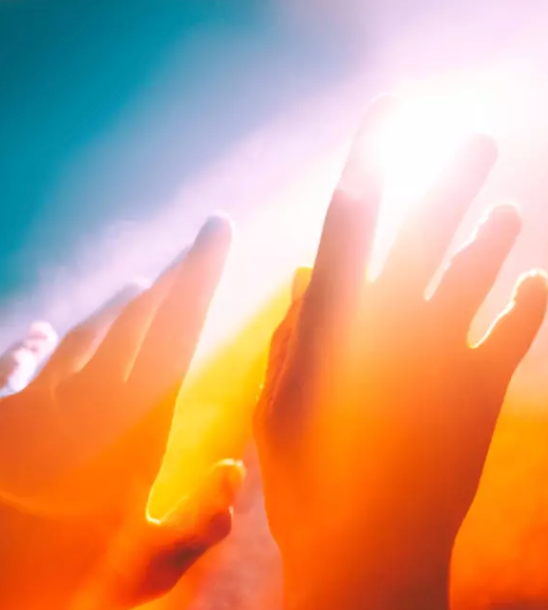Julie Poole, a woman who claims to have “died and spent three days in heaven,” has been sharing the profound and chilling messages she received from what she describes as “angelic beings” in a “higher realm.” Her story begins at 21 when, overwhelmed by years of emotional, physical, mental, and sexual abuse, she attempted suicide by overdosing on medication. What followed, according to Poole, was not the end of her life but a transformative experience that has shaped her beliefs and career as a spiritual guide.
After her overdose, Poole describes being “dead” for three days, during which time she visited what she calls the “higher realm.” There, she says she was greeted by spiritual beings, who were not only her guides but also messengers of mankind’s future. Among these beings was a “white shimmery figure” who enlightened her with visions of what was to come for humanity. According to Poole, these otherworldly beings revealed to her that she wasn’t destined to die that day, even though she believed she was ready to leave the pain of her life behind. They told her, “It’s not your time,” and sent her back to her earthly body, but not without a clear message: she would return to the higher realm at the age of 67.

Now in her early 60s, Poole says that she only has a few years left to live, based on this prophetic message. She continues to share the lessons she received during her time “in heaven,” claiming that these revelations were meant to guide humanity toward a more enlightened future. One of the key messages she received was about the purpose of her own suffering. According to Poole, the spirits told her that before she was born, she had chosen a life filled with hardship in order to “clear karma” from previous lives. Despite their warnings that such a life would be difficult, she accepted the challenge, believing it was a necessary step in balancing her spiritual debts.
“They warned me it would be too hard and too overwhelming,” Poole recalls. “But I chose this life anyway. And now here I was at 21, trying to check out… and they had to heal me enough to send me back.” The spirits emphasized to her that part of her mission in life was to forgive—herself and others—because forgiveness, they said, is one of the highest vibrational forms of love.
In addition to her personal journey of healing and forgiveness, Poole was also given a glimpse of what she calls the “Golden Age” for humanity, a future era of peace, equality, and spiritual awakening. She was told that this age was already in progress and would occur between 2012 and 2032. According to Poole, this Golden Age would bring an end to the power struggles, corruption, and control that have defined human history for millennia. “The beings told me that for so long, power and control had been concentrated in the hands of a few, while the masses were left to suffer under this imbalance,” she explains. “But in the Golden Age, all that is false and corrupt will fall away, and humanity will experience true equality.”
Poole’s guides told her that the shift toward this Golden Age would not be marked by dramatic cataclysms or “Armageddon” but would instead involve the gradual unraveling of the systems that have oppressed humanity. “This isn’t about the end of the world,” Poole says. “It’s about the end of the old ways. The power structures that have stifled human potential will crumble, and people will be free to live with greater truth, love, and fairness.”

She also claims that individuals like herself—those who have had near-death experiences or spiritual awakenings—are being sent back to Earth with a mission: to share these messages of hope and help humanity transition into this new era. Poole says her role is to help others understand the significance of the changes ahead and to encourage them to embrace forgiveness and compassion as tools for personal and collective healing.
But Poole’s revelations don’t stop there. She also believes that extraterrestrial beings play a key role in this transformative period for humanity. According to her, “ETs,” or beings of light, have been visiting Earth for many years, helping humanity in ways that most people are not aware of. These extraterrestrial beings, Poole says, are far more advanced than humans—technologically, spiritually, and in every other way. She insists that they have been closely monitoring humanity’s progress and will intervene if necessary to prevent global catastrophes.
One specific example Poole gives is the potential threat of nuclear warfare. She claims that if world leaders ever become “trigger-happy” with nuclear weapons, these advanced extraterrestrial beings will step in to stop it. “They will not let us blow ourselves up,” Poole asserts. “They will not let us destroy this planet. They will step in if we push things too far.”
While Poole’s claims are certainly extraordinary, they have also earned her a following. She has built a career as a “spiritual master” and life coach, helping people navigate their own journeys of healing and personal growth. Through her YouTube channel and other platforms, Poole continues to share her story and the insights she believes she received during her near-death experience.

Now in her early 60s and with only a few years left before the age she was told she would return to the higher realm, Poole remains focused on her spiritual mission. She believes that her purpose on Earth is to prepare others for the coming changes, helping them to release old patterns of fear, anger, and division, and embrace a higher vibration of love and forgiveness.
As she reflects on her life and the messages she received, Poole is clear on one thing: the future of humanity, while uncertain, holds great promise. She remains convinced that the Golden Age is near, and she feels privileged to have been given a glimpse of it during her time in the higher realm. For Julie Poole, the lessons of her near-death experience continue to shape her life and guide her work as she prepares for whatever comes next—both in this world and the next.
I Asked to See My Wedding Pics & Saw My Husband Kissing Another Woman at Our Wedding

What a powerful and emotionally charged story! Jess’s wedding day takes a devastating turn, highlighting themes of trust, betrayal, and the unexpected twists of love. The juxtaposition of the joyous wedding atmosphere against the shocking revelation of Adam’s infidelity makes for a compelling narrative.
The choice to reveal Adam’s betrayal during the reception adds a dramatic flair, showing Jess’s strength and her unwillingness to accept dishonesty, even on what should be one of the happiest days of her life. It’s fascinating how the story captures the complexity of relationships and the impact of actions on love and trust.
Jess’s decision to annul the marriage and take her sister on the honeymoon speaks to her resilience and desire for self-empowerment. It raises questions about how we process betrayal and the importance of surrounding ourselves with supportive loved ones during difficult times.
If you’d like to explore more themes or characters, or perhaps develop the story further, I’d be happy to help!



Leave a Reply